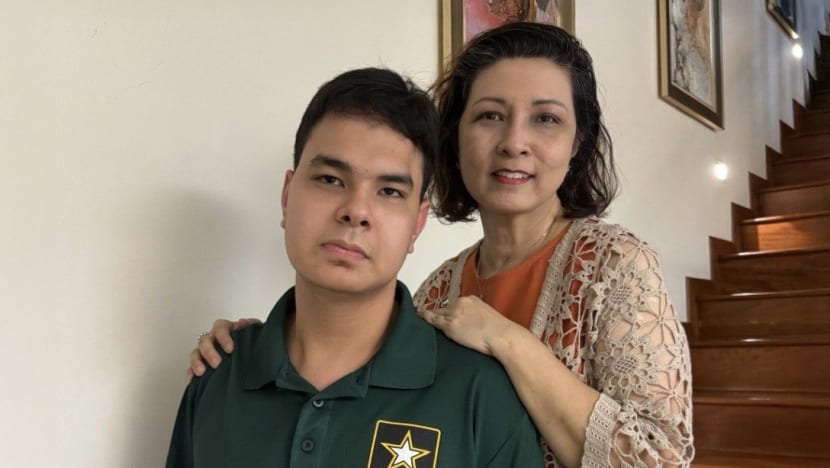Health
Singapore Mother Reflects on 17 Years of Caregiving Challenges

When Juanita Mega gave birth to her son Waleed on March 15, 2006, she envisioned a life filled with joy and milestones similar to those of her two older children. However, from the very beginning, it became apparent that Waleed’s journey would be different. He was born prematurely at just 28 weeks, weighing only 1.25 kilograms, and did not cry upon arrival. Juanita recalls the overwhelming emotions of that moment, describing the sight of her son in the Neonatal Intensive Care Unit (NICU) as “numb,” noting that he was both “perfect” and “so tiny and fragile.”
Waleed faced significant health challenges, including intracranial bleeding, known as intraventricular haemorrhage (IVH), which is common among premature infants. After spending 101 days in the NICU, he underwent multiple surgeries, which left him in pain and required intensive aftercare. Juanita took on the role of primary caregiver, as her husband traveled frequently for work, managing medication, monitoring fevers, and attending to Waleed’s emotional needs. She also balanced the responsibilities of caring for her older son and daughter, often feeling overwhelmed.
As Waleed grew, the family faced numerous challenges, including frequent hospital visits and the impact of his diagnosis of global developmental delay at the age of three. This condition affects cognitive and developmental functioning, and while Waleed has made strides, he still struggles with tasks that many children his age find simple. “When you look at him at a glance, he looks alright,” Juanita shared. “But he cannot focus on certain tasks for too long.”
Overcoming Isolation and Finding Support
Juanita’s journey as a caregiver has been marked by both resilience and isolation. The emotional burden was often compounded by a lack of support and understanding from those around her. “The doctors, therapists, and counsellors were focused on him, and I don’t remember anyone asking how I was doing,” she revealed. For years, she maintained a brave facade, even as feelings of loneliness and emotional desolation grew.
It was not until 2018, when Waleed was ten years old, that Juanita acknowledged her own struggles and sought help. This decision marked a turning point after a decade of shouldering the responsibility largely alone. She described the strain on her marriage as both she and her husband coped with Waleed’s needs in their own ways, leading to feelings of anger and resentment.
Once she reached out to friends and family, the emotional weight began to lift. Juanita recognized the importance of recalibrating her expectations, transforming her caregiving role from a burden into a form of advocacy. She became an outspoken supporter for Waleed, ensuring that his educational needs were met and that he was not dismissed due to his challenges.
Redefining Identity Through Caregiving
Juanita’s professional life also suffered due to her caregiving responsibilities. Working part-time for over a decade, she struggled with feelings of guilt about pursuing personal interests or furthering her studies. “I felt like I have forgotten myself, my identity,” she admitted. The demands of caregiving often left her with little time for relaxation or social engagements.
Despite these challenges, Juanita discovered a profound sense of purpose and connection with her son. “Caregiving reshaped my identity,” she stated. “This process was a journey in itself.” Her faith and support from her mother, as well as kindness from colleagues like David Harrison, the former CEO of Intuition, provided her with the flexibility to navigate her responsibilities while maintaining a connection to the workforce.
Today, Juanita is committed to raising awareness about the challenges faced by caregivers. She emphasizes that caregiving is not merely a duty but rather a vocation, often filled with invisible labor and emotional tolls. “I wish more people could see and appreciate the strength it takes to show up every day with love,” she said.
As for Waleed, Juanita dreams of inclusive spaces where he can thrive, contribute, and be recognized for his achievements. She aspires for him to experience a life of dignity, joy, and connection while remaining healthy. “My dreams for Waleed are rooted in possibility, not perfection,” she reflected. “I’ve learned to honor his unique self and strengths.”
Juanita Mega’s story serves as a powerful reminder of the resilience of caregivers and the importance of support systems that recognize both their challenges and triumphs.
-

 Business5 months ago
Business5 months agoKenvue Dismisses CEO Thibaut Mongon as Strategic Review Advances
-

 Lifestyle4 months ago
Lifestyle4 months agoHumanism Camp Engages 250 Youths in Summer Fest 2025
-

 Sports4 months ago
Sports4 months agoDe Minaur Triumphs at Washington Open After Thrilling Comeback
-

 Sports5 months ago
Sports5 months agoTupou and Daugunu Join First Nations Squad for Lions Clash
-

 Top Stories5 months ago
Top Stories5 months agoColombian Senator Miguel Uribe Shows Signs of Recovery After Attack
-

 World5 months ago
World5 months agoASEAN Gears Up for Historic Joint Meeting of Foreign and Economic Ministers
-

 Health4 months ago
Health4 months agoNew Study Challenges Assumptions About Aging and Inflammation
-

 Business5 months ago
Business5 months agoOil Prices Surge Following New EU Sanctions on Russia
-

 Entertainment4 months ago
Entertainment4 months agoDetaşe-Sabah Violin Ensemble Captivates at Gabala Music Festival
-

 Entertainment4 months ago
Entertainment4 months agoBaku Metro Extends Hours for Justin Timberlake Concert
-

 Top Stories5 months ago
Top Stories5 months agoRethinking Singapore’s F&B Regulations Amid Business Closures
-

 Business5 months ago
Business5 months agoU.S. House Approves Stablecoin Bill, Sends to Trump for Signature









